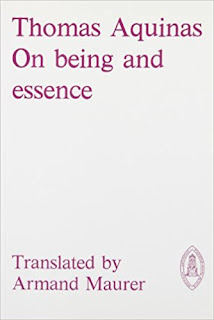PROPERLY speaking, being (esse) belongs only to those things that are truly beings (entia), namely substances or subsistent things. Being can be attributed to non-subsistent items, such as accidents, forms, and parts, but strictly speaking these do not have being, being is ascribed to them because through them or because of them substances have being in some special way, as for example a man is wise through the quality of wisdom.
The notion of esse does not emerge very clearly from St. Thomas’ analysis of metaphysical terms in chapter one. The word appears several times in its technical sense, but it is left unexplained. Attention is focused on the notion of ens (‘a being’), from whose analysis the notion of essence is then disengaged as that in which and through which a thing possesses being (esse); but what is the esse a thing possesses?
Later chapters make it clear that esse is an actuality received by a thing’s essence, which in turn is potential to it. It is outside the definition of the essence and it forms a composition with the essence. In God, esse is his essence; he does not possess esse but is esse itself. Esse, understood purely and simply, contains all perfections. Thus as we read On Being and Essence we come to realize that its most important term is esse. A being is a being only because it has esse; an essence is an only through the esse that posits it in reality. But what is esse? This is the question that plagues the reader throughout the treatise and which no clear answer is given. But at least we are told the direction in which to look: the mystery of being esse is identical with God; if we knew what esse is, we would know the essence of God, for only in him is esse an essence or nature. In creatures esse does not have the status of an essence; they have essences which are other than esse and which exists by participating in the divine esse.
The identification of God with pure esse warns us that for St. Thomas being is not the mere fact that a thing exists, or is present in the world. If this were the meaning of esse, it would hardly make sense to call God esse tantum: nothing but being, or pure being. In fact, esse is dynamic and energizing act, as Gerald B. Phelan well describes it: “Things which ‘have being’ are not ‘just there’ (Dasein) like lumps of static essence, inert, immovable, unprogressive and unchanging. The act of existence (esse) is not a state, it is an act, the act of all acts, and, therefore, must be understood as act and not as any static and definable object of conception. Esse is dynamic impulse, energy, act – the first, the most persistent and enduring of all dynamisms, all energies, all acts. In all things on earth the act of being (esse) is the consubstantial urge of nature, a restless, striving force, carrying each being (ens) onward, from within the depths of its own reality to its full self-achievement, i.e., fully to be what by its nature it is apt to become.”
—Excerpt from Armand Maurer's introduction to
Available at Amazon
